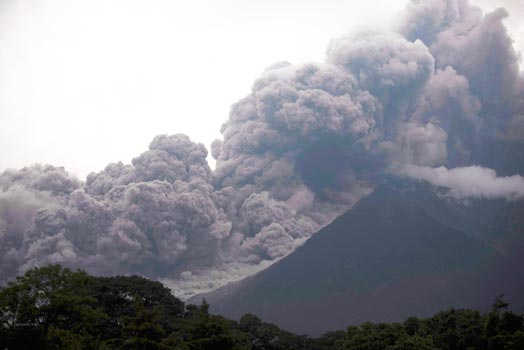
Nigeria has condoled with the government and people of the Republic of Guatemala over the Fuego volcanic eruption tragedy in the country.
The Non-Resident Ambassador of Nigeria to the Republic of Guatemala, Aminu Iyawa, conveyed the heartfelt condolences of President Muhammadu Buhari to President Jimmy Morales of the Republic of Guatemala.
Mr Iyawa, who is also Nigeria’s Ambassador to Mexico, and the Non-Resident Ambassador to the Republic of Panama, said Buhari considers Guatemala one of Nigeria’s most important allies in the whole of Central America.
“President Buhari joins the good people of Guatemala and especially the families of the deceased in praying for the repose of the souls of their loved ones.
“President Buhari considers Guatemala as one of the closest allies Nigeria has in Central America and will, therefore, always share and identify with any development, progress or tragedy, with the government and the people of Guatemala,” the letter said.
Meanwhile, the ‘Volcano of Fire’ exploded again for the first time since its devastating eruptions on Sunday which killed at least 75 people.
The nation’s National Disaster Agency (CONRED) ordered evacuations in the town of Escuintla as hot gas and molten rock poured down the southern slopes of the volcano on Tuesday afternoon.
The powerful blast unleashed a rapid flow of gas and volcanic debris which quickly enveloped homes, trapping and killing those inside.
The explosions threw ash more than 5,000 meters above sea level, with Guatemala’s seismology and volcanology institute warning that there is a moderate flow of dangerous material down the volcano, with the possibility of a strong flow in some areas.
Tuesday’s evacuation orders triggered panic and heavy traffic, even in areas which have not been affected by the latest eruption.
About 2,500 people have been evacuated to emergency shelters in Escuintla after being forced to flee their homes in surrounding villages.
Officials say a total of 192 people were still missing, but the search for bodies in mountainous areas destroyed by the eruption has been progressing slowly.
“We will continue until we find the last victim, though we do not know how many there are. We will probe the area as many times as necessary,” said Sergio Cabanas, head of CONRED.
About 10 small eruptions every hour had been reported by seismologists, but none of them compared to the major blast which shook the region on Sunday afternoon.
That eruption unleashed a rapid flow of gas and volcanic debris which quickly enveloped homes nearby, killing those inside.
Warnings had been issued, but they came too late for some communities to escape.
Only 23 of the bodies recovered so far have been identified. Many of the victims are unrecognizable, with officials warning that DNA testing and other methods may be needed to identify them.
In places like Los Lotes and the village of El Rodeo, about eight miles down slope from the crater, it was too late for many residents to escape.

Biden Administration Imposes New Sanctions On Iran Following Attack On Israel
Israel’s European Allies Urge Restraint Amid Escalating Tensions With Iran
Israel Prepares For Possible Attack From Iran As Tensions Escalate
Senegal’s President Bassirou Appoints Ousmane Sonko As New Prime Minister